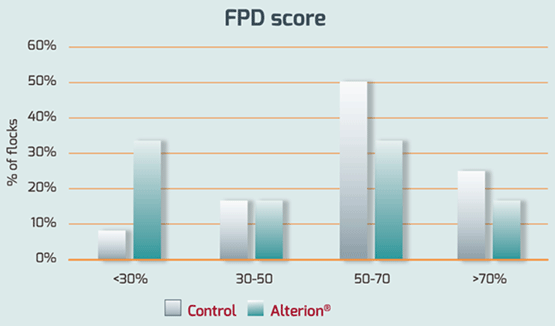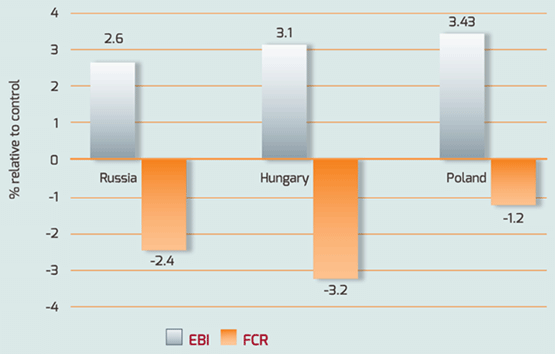Consistency is Vital for Antibiotic-Free Poultry Production
Published: December 19, 2021
By: Aurélie MOAL, Global Marketing Manager, Health by Nutrition – Adisseo. Pascal THIERY, Head of Applied Nutrition & Feed Technology – Adisseo
A focus within the poultry and feed industries is to remove or reduce reliance on antibiotics. Feed additives can be added to a feed as an alternative to antibiotics, but the main challenge that emerges is the need to ensure they perform consistently under commercial conditions. A probiotic that has a consistent action and can enhance animal resilience, through three lines of defence, is an excellent alternative to antibiotics and can help ensure the sustainability of poultry production.
ANTIBIOTIC REDUCTION
The reduction and elimination of antibiotics has been surveyed* as being the greatest challenge to feeding programs by the poultry industry. This year, 24% of the respondents have reported that their operations are antibiotic free, that is 3% more than the previous year. A further 25% stated that 50% of their poultry production was antibiotic free.
However, new EU regulations on veterinary medicines and medicated feeds will come into force at the end of January 2022. One of the main objectives of this legislation is to: “strengthen the EU’s actions to fight antimicrobial resistance through specific measures, thus ensuring a prudent and responsible use of antimicrobials in animals, including reserving certain antimicrobials for the treatment of infections in people.” This aim, along with consumer pressure, means that antibiotic free production is expected to continue to grow. Around 60% of broiler production in the USA is antibiotic free. This practice is also growing in Latin America and Asia, particularly in those countries that export to the EU and China.
CHALLENGES
The industry faces two significant poultry health challenges as a result of an antibiotic reduction/elimination: necrotic enteritis and coccidiosis. Alternative feed additives that promote a beneficial microbiome and support the immune function and gut barrier have a role to play in such challenges. Improved gut health and animal resilience will also help poultry deal with these challenges.
A well-developed gut and optimal microbiome help support poultry performance and enable birds to deal with challenges better – in turn reducing the need for antibiotics. Gut health is important for both the immune function and nutrient absorption, both of which have a positive impact on the health and growth of poultry. The use of probiotics has grown as antibiotic free production has increased, along with a greater understanding of the importance of a healthy gut microbiome.
DEPENDABLE PRODUCT
The main concern when replacing antibiotics is inconsistent results from feed additive alternatives. The survey respondents utilized and/or combined probiotics (64%), with organics acids (61%), enzymes (57%) and phytogenics (51%). They reported that probiotics showed a good level of efficacy (72% in 2020), as did organic acids (69% in 2020). In 2021, 59% of the interviewed people were planning to increase their use of probiotics; however, not all probiotics are the same.
Alterion® is a complete probiotic solution for poultry, specifically designed to deliver a consistent performance. Developed by Adisseo, an expert in animal nutrition, in collaboration with Novozymes, the world leader in biological solutions, the product is the result of a stringent selection process: over 900 AAFCO-listed bacterial strains were screened, before testing their activities in vitro and in vivo.
CONSISTENCY THROUGHOUT
In spore form, Bacilli are naturally protected from pressure, acidity and temperature. The most stable strain – Bacillus subtilis DSM 29784 – was chosen to provide superior safety, stability, effectiveness and functioning. This naturally occurring bacterial strain is harmless for animals and humans and does not contain antibiotic resistance genes, which is vital for the safety of the product and to preserve the health and welfare of animals.
Thanks to an innovative formulation, probiotic spores are ‘glued’ onto calcium carbonate particles. This advanced process ensures a low level of dust, low segregation of the spores and no demixing of the product in feeds or premixes, even after storage.
RESILIENCE
Tests were also carried out to select the strain with the most efficient germination characteristics. Bacillus subtilis DSM 29784’s unique stability and timely germination ensure consistent activity in the intestine, where it produces metabolites and acts at three levels:
- on the microbiota – creating a beneficial balance in the microbial populations and functions
- on the intestinal wall – improving the gut barrier function, the size of the villi and the absorption of nutrients
- on the immune system – controlling the inflammatory response
RELIABLE RESULTS
Although it is important to test additives at research institutes, it is also essential, for poultry producers, that products perform consistently under commercial conditions. Alterion® was fed to broilers on three farms that belong to a French poultry production organization, over four consecutive cycles. These three farms were selected from among the top 30% of performing farms. The bacterial enteritis and coccidiosis scoring performed on these farms confirmed that all the flocks had a good health status.
When performance was already excellent, the data showed that FCR (standardized to 1.85 kg of the body weight) was on average improved by 3 points and liveweight by 6.5 grams when the birds were fed Alterion® (Figure 1). Such improvements in performance led to a 2% better European Broiler Index (EBI) and a 0.54 € /m² gross margin.
Figure 1. Alterion® consistently improved broiler performance and profitability in field conditions (France, 2020)

A foot pad dermatitis (FPD) scoring system is used by slaughterhouses, along with other carcass quality measures, to evaluate the welfare of broiler flocks. The addition of Alterion® reduced the level of severe FPD scores by over 10%, which resulted in a higher carcass value for the producers (Figure 2). There was a significant reduction in the cloacal presence of Enterococcus cecorum and a tendency toward a reduced Proteobacteria-to-Firmicutes ratio, thus indicating a more balanced microbiota, with a greater proportion of butyrate producing bacteria.
Figure 2: Alterion® reduced severe foot pad dermatitis scores in broilers under commercial conditions Pododermatitis lesions were evaluated at a slaughter level as the % of the birds of the flock that showed severe FPD lesions. The obtained % is the proportion of birds from the flock that showed less than 30%, 30 to 50%, 50 to 70% and over 70% severe FPD lesions.

The consistency of these positive results has been backed up by studies on commercial farms in Hungary, Russia and Poland. In all three trials, broilers fed Alterion® showed a better FCR and overall performance (Figure 3). EBI standardizes and compares technical results: feed conversion, mortality, and daily gain. The evaluation incorporated data from over 1,200,000 birds and showed a consistent improvement in performance under a variety of field conditions.
Figure 3: Comparison showing consistent performance improvements in broilers fed Alterion in field trials in Russia, Hungary and Poland

CONSISTENT SOLUTION
Alterion® helps animals face external challenges, maintains physiological homeostasis, and helps to ensure their resilience. By reducing the impacts of stress on an animal, the energy from the feed is used more for growth, instead of being diverted to the immune system. This means better growth rates and better feed utilization, but also a saving of resources. The product meets the challenge of consistency in the performance of alternative feed additives, which is required because of the rise in antibiotic free poultry production.
The results of the field trials support Alterion’s consistency to a great extent. The product also leads to a reduction in foot pad dermatitis, a welfare issue that is linked to a better control of gut health parameters. This probiotic solution enhances animal resilience by acting on three lines of defence (microbiota, gut barrier and immunity), thus ensuring a consistently improved performance. Trying to keep poultry as healthy as possible reduces the need for antibiotics and improves their welfare. The consistent mix and consistent action of the product makes it a reliable alternative for the responsible use of antibiotics, and for a wider sustainability of poultry production.
*External survey, reference available upon request
Related topics:
Authors:
Adisseo
Adisseo
Influencers who recommended :
Damien P. PrévéraudRecommend
Comment
Share
Sanluc International nv
16 de marzo de 2022
It looks indeed like inconsistency is the critical concern with probiotic type additives proposed as AGP alternatives, since many producers of Bacterial type products do communicate intensively on that issue. Related to the field experiments at the French poultry producer organization, we wonder if presenting the individual results at the three farms and the four individual cycles would not have been better documenting eventual consistency. Its hard to conclude consistent response, based on only one average number.
One will agree that field trials (house to house) setups are the most inconsistent and maybe not the proper one to document or proof consistency. For sure not if all is put together.
On the contrary, the low level of improvements suspect large individual variations between these 2 x 4 flock cycles with positives and negatives.
Furthermore the pretended extra 6,5 grams extra live weight is neglect able and even not correct since the treatment birds were 0,2 days older, so after correction the CONTROL birds are 4,36 grams heavier. Contrary to what is stated, the performances of 2086 grams LW and 1,641 FCR at 36,2 days are very weak, compared to Ross 308 standards (2384 grams and 1,447) and Cobb 500 standards (2629 grams and 1,457) : live weight is about 14-26% too low and FCR some 12-13% too high. Even not noticing that in practice today performances level in NW Europe are many times above standard. Today an EBI of 330-340 is not economical at all, so the few 6 points do not make a difference and is of no value coming out of field trials. Performance differences between even two fully identical house can raise up to 10-15%, with exactly the same feed.
Recommend
Reply

Would you like to discuss another topic? Create a new post to engage with experts in the community.
Featured users in Poultry Industry

Shivaram Rao
Pilgrim´s
PhD Director Principal de Nutrición y Servicios Técnicos de Pilgrim’s Pride Corporation
United States
United States





